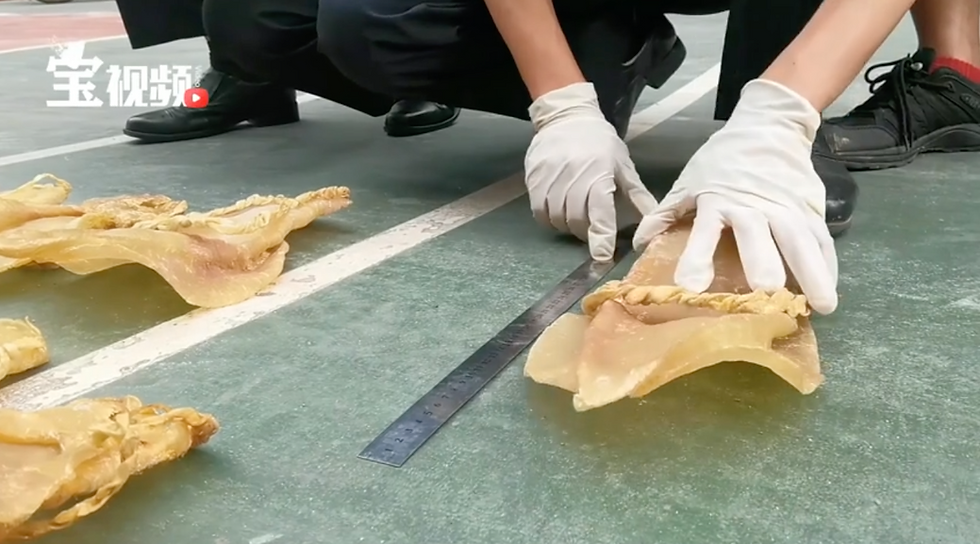Dried seahorses and totoaba bladders smuggled from Vietnam seized by Chinese police
- Jul 29, 2021
- 3 min read
Chinese media reported two large seizures of dried seahorses and one of totoaba fish bladders in Guangxi Autonomous Region. The contraband was smuggled into China from Vietnam, which Guangxi shares a long border with.
The first seizure was made on the 11th of May in Fangchenggang municipality - a hub of the trade with Vietnam and the location of a major maritime trading port. While on a routine patrol, a border police unit spotted a motorised tricycle emerging from a small side road leading to the border - a route known to be frequented by smugglers.

A dried seahorse. There is a great demand for these to make traditional Chinese traditional medicine. All seahorses are now now classified as Grade II nationally protected species in China, but large shipments are smuggled in from South East Asia.
Having followed the tricycle, the police arrived at a village house. A search yielded bags packed with 6,267 dried sea horses and 136 dried totoaba bladders. The total value of the seized products was reported as 5.24 million yuan (USD 808,000), with totoaba estimated at 4.3 million yuan (663,000 USD), and seahorses at 0.94 million yuan (USD 145,000).
Totoaba bladders come from totoaba fish that is found only in the Gulf of California. Due to the Chinese demand for its swim bladders, the species is now on the verge of extinction, despite the trade being officially banned.

Dried totoaba swim bladders seized by Chinese police from smugglers in Guangxi Autonomous region. Image: Nanjing Evening Newspaper / Nanjing Bao
Dried sea horses and totoaba swim bladders are used in Chinese traditional medicine. The prices for both products in China have soared in recent years – dried totoaba swim bladders cost up to 80,000 US dollars per kilogram, and dried sea horses as much as 2,000 dollars.
After a successful seizure of wildlife products (be it horns, ivory or bones) in China, the police have a practice of spreading out the contraband on the ground for the media to take photos. Usually, the location of choice is the police station’s basketball court. This case was no exception. It took the policemen a long while to spread out thousands of small seahorses, and the dried animals took up half the court, noted the media.

Dried seahorses seized from smugglers laid out on a basketball court. Image: Nanjing Evening Newspaper / Nanjing Bao
Two suspects – Lin and Liao, were arrested and both confessed to their crime. The pair were no kingpins, but employed by someone else to bring the wildlife contraband across the border. Who that someone else may be, the media did not specify.
The second seizure was made on the 5th of July, when a 4x4 vehicle was stopped at a police roadblock in the dead of the night in Chongzuo municipality, also on Guangxi’s border with Vietnam. Such roadblocks are ubiquitous in China’s border regions.
The driver of the stopped vehicle, surnamed Teng, visibly panicked. Avoiding eye contact, Teng claimed that there was nothing in the boot of his car but two pieces of clothing, imploring the police to let him go as he was pressed for time.
Such counterproductive tactic backfired on Teng – his car was immediately searched, yielding a bag with more than 4,000 dried seahorses inside. The value of the cargo was estimated at over 600,000 yuan (93,000 USD).
Soon, Teng, described as “cunning” by the press, was paraded, handcuffed, for photos – next to a police station’s basketball court covered in dried sea horses.
Teng, Lin, and Liao are facing long prison sentences. Sea horses are listed as Grade II nationally protected species in China. Totoaba are not found in China, but their listing in CITES Appendix I gives the species a status equivalent to that of Grade I nationally protected species.
According to the Article 151 of the Criminal Law of the People’ Republic of China, smuggling of endangered and valuable species, and products made from them, is punishable by a 5 to 10-year prison term.




Comments